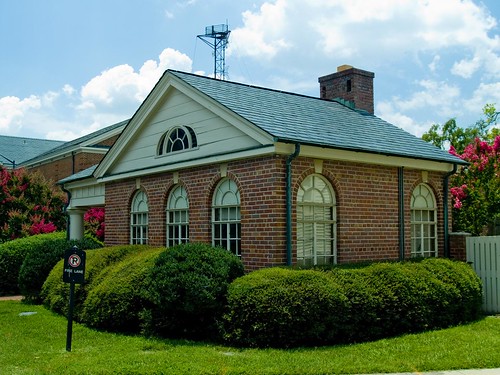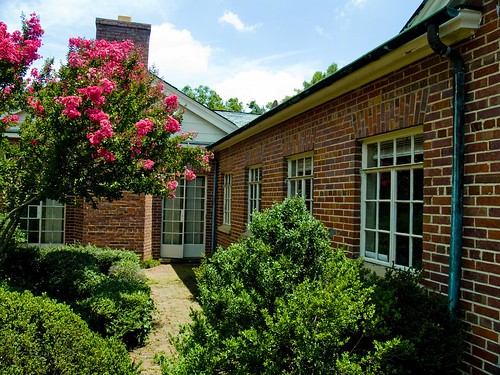Wednesday, October 27, 2004
Fright night on Franklin Street
Residents have reveled in or put up with the downtown Halloween celebration for years now.
But just when did Franklin Street morph into the largest demon destination in the state?
Though no one can pinpoint the date, most interviewed said downtown Halloween crowds started growing sometime in the 1970s.
"I was sitting in the window of Spanky's on Halloween in 1979," recalls former councilman Joe Herzenberg. "I just noticed it was really not what it used to be. It was really getting to be a big thing."
Monday, October 4, 2004
Attempt to save West House is only getting started

West House on campus at UNC-CH, before its August, 2006 demolition.
The West House Coalition reiterates our support for the Arts Common and its programs, that we believe the Common can support those needs without sacrificing West House, and that it seems clear Arts Common architects were never asked to consider incorporating the house into the Common -- an exciting challenge for any firm. Since last January we have heard from numerous folks in all stages of planning and public debate that claim West House was seldom, or only peripherally discussed.
Paul Kapp was hired by UNC after the house's fate was sealed. His recent guest column in The Chapel Hill Herald and comments in The Daily Tar Heel imply that West House preservationists insult Carolina's preservation record. We have publicly praised Carolina's preservation activities, including Mr. Kapp's hiring. Observing the quality restorations of our beautiful historic buildings inspired our group to take up the house's fate. It should be noted, master planners also sought to demolish Smith and Swain Halls until Myrick Howard of Preservation North Carolina insisted that they and West House should be saved. Indeed, the Y-Court, also slated for demolition, was saved by an enormous outcry from students and alumni.

West House garden view
It's important to clarify that West House does not sit on top of any utilities. The house was built in 1935 on private property before any utilities were underground. Utilities are under at least one, if not all, of the myriad Music Building footprints (and despite protestations otherwise, the building's architects confirm no footprint is yet set).
West House represents one-third of Carolina's history with many noted historic associations. During the last two home football games, alone, the Coalition has gathered more than 500 signatures from alumni, students, faculty, employees, and visitors in support of the house. We've only just started.
Joe Herzenberg
Chapel Hill

Demolition of West House, August 17, 2006.
(Editor's note - the efforts of the Save West House Coalition were ultimately defeated by the tear-down-the-past, uncaring, shortsighted agenda of the UNC-CH administration under Chancellor James Moeser.)
Friday, October 1, 2004
’81 killing spurred Durham gay rally, one of N.C.’s 1st
In April 1981, four sunbathers on the banks of the Little River were attacked by a group who, witnesses said, headed toward them shouting, "We're going to beat some faggots!"
One man, 46-year-old Ronald Antonevich, died three days later.
Joe Herzenberg, who is gay and was a Chapel Hill Town Council member at the time, said he remembers the death vividly.
"It meant that somebody could be killed or badly hurt because somebody thought you were gay," he said.
The attack also enraged Durham's small gay community, prompting "Our Day Out," what Herzenberg recalls as one of North Carolina's earliest gay rallies. The event attracted hundreds of supporters and curious onlookers, and brought a
new civil rights issue into prominence.
Much has changed in the 23 years since Antonevich's fatal beating and the rally that followed. Durham's gay pride festival is now a statewide event that attracts several thousand people. This weekend, PrideFest 2004 celebrates "20 Years of Pride," including the march sparked by the attack and the parades that began a few years later. The activities begin tonight with a "Ninth Street Promenade" and continue Saturday with speeches and a parade on and around Duke's East Campus.
"The climate in Durham is one of the more accepting climates in the state," said Ian Palmquist, executive director of Equality North Carolina, a political action committee working for the gay, lesbian, bisexual and transgender community. "The state as a whole still is relatively conservative," he said, "and, certainly, the work being done in places like Durham is leading the state forward."






